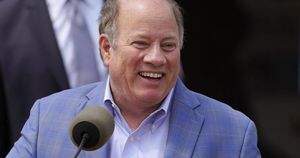On November 24, 2024, Uruguay witnessed significant political change as leftist candidate Yamandú Orsi emerged victorious over conservative Álvaro Delgado, marking the return of the Broad Front to power after five years of center-right governance. Orsi, representing the Broad Front coalition, secured approximately 49.8% of the vote, which reflects not only his popularity but also the shifting sentiments of voters disillusioned with the outgoing administration.
Addressing his supporters amid jubilant celebrations, Orsi, who previously served as the mayor of Canelones and is known for his working-class roots, declared, "The country of liberty, equality, and fraternity has triumphed once again." He emphasized the importance of national dialogue and unity, stating, "Let’s understand there is another part of our country with different feelings today. These people will also have to help build a more integrated society. We need them too." This message of inclusivity is particularly noteworthy, as it reflects his intention to govern for all Uruguayans.
During his victory speech, Orsi underscored the need for collaboration and constructive dialogue moving forward. He stated, "I will be the president who calls for national dialogue again and again, who builds a more integrated society and country." His campaign, likened to the legacy of former President José "Pepe" Mujica, who was pivotal in enacting progressive reforms like the legalization of abortion, same-sex marriage, and the sale of marijuana, is expected to carry forward many of Mujica's leftist ideals.
Orsi's win is viewed as part of larger global trends where incumbent parties face increasing challenges. This election not only reflects domestic dissatisfaction with the economy, which many have criticized for stagnant growth and rising crime rates but also echoes similar sentiments expressed by voters across multiple countries, fostering discontent against ruling parties.
The electoral competition remained tight, with Álvaro Delgado conceding defeat even as votes were still being counted. He acknowledged Orsi’s victory, saying, "With sadness, but without guilt, we can congratulate the winner." Despite the loss, his supporters saw the run-off as evidence of their continued influence and vowed to remain active participants in the political discourse.
Turnout for the election was remarkably high, nearing 90%, with approximately 2.7 million citizens eligible to vote. Such engagement is indicative of Uruguay's strong democratic infrastructure and citizen participation, a stark comparison to the anti-establishment movements witnessed elsewhere, such as those seen recently in the U.S. and parts of Europe.
Orsi's administration is expected to maintain moderate economic policies, avoiding drastic shifts but promising improvements geared toward economic stability and social equity. He plans to attract investments without resorting to tax hikes, reflecting his focus on stimulating economic growth to tackle the pressing issues of poverty, which currently affects nearly 25% of children, and the rising tide of organized crime, which has shaken the country renowned for its safety.
Both supporters and critics are watching closely as President Luis Lacalle Pou, the outgoing leader and Delgado's backer, quickly reached out to Orsi to congratulate him, indicating the commitment to ensuring a seamless transition. Lacalle Pou’s government, which prioritized pro-business policies, recorded some economic recovery but faced scrutiny over its handling of crime and the economy.
Overall, Yamandú Orsi's win signifies not just the return of the Broad Front but also points to the electorate's desire for progressive policies and socio-economic improvements. The balance he seeks to strike between fostering economic growth and ensuring social justice will be pivotal as he takes on the responsibilities of leadership, with strong public expectations riding on his tenure.
With Orsi's ascent, Uruguay joins the ranks of nations around the world expressing their desire for change, reflecting broader global trends against incumbents. This new chapter under his leadership promises to rekindle the country’s social initiatives and uphold its values of liberty, equality, and fraternity as key pillars of governance.



